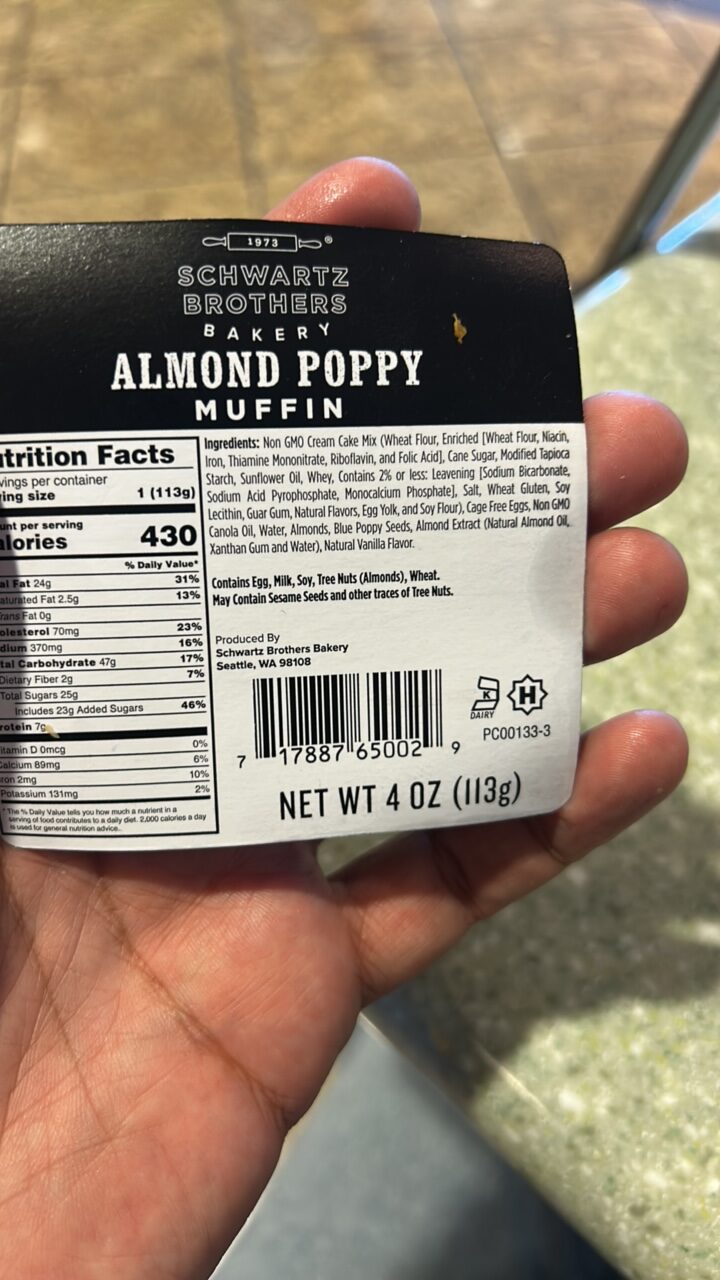
Barcode: 717887650029
almond poppy muffin
HALAL
📝 Reason: According to Islamic law (Quran 5:3), food must not contain pork, alcohol, or doubtful substances. While most baking ingredients are Halal, ingredients like ‘natural flavors’, ‘almond extract’, and ‘natural vanilla flavor’ may involve alcohol or animal derivatives unless certified otherwise, making them Doubtful. As per Halal rules, if any ingredient is Doubtful the final product becomes Doubtful (Mashbooh) unless product certification is present. (See IFANCA, SoundVision.com for detailed ingredient rulings.)
🏷️ Category: Muffin
📄 Certificates: Non Gmo, Vegetarisch
Ingredients:
Details
Understanding the Halal Status of Almond Poppy Muffin
When it comes to complying with Islamic dietary laws, understanding whether certain food products are Halal is crucial for many consumers. Today, we’ll be diving into the Halal status of the Almond Poppy Muffin and exploring its ingredients in detail.
What Makes a Product Halal?
According to Islamic law (Quran 5:3), food must not contain prohibited substances such as pork, alcohol, or ambiguous components. Generally, most ingredients found in baking are Halal…
Key Ingredients of Almond Poppy Muffin
The Almond Poppy Muffin is composed of several ingredients, each of which we need to analyze for its Halal status. Here’s a breakdown of the ingredients and their statuses:
- Non-GMO Cream Cake Mix: A mixture that comprises wheat flour, sugar, and leavening agents, deemed Halal due to lack of haram components.
- Wheat Flour: This plant-based flour is Halal by nature.
- Enriched: Typically refers to vitamins and minerals added; made with non-haram items.
- Niacin: A necessary vitamin sourced from plants or synthetic methods, classified as Halal.
- Thiamine Mononitrate: Another synthetic vitamin that is Halal.
- Riboflavin and Folic Acid: Both are generally either synthetic or plant-based and thus are Halal.
- Cane Sugar: While Halal, one must ensure it has not been filtered through charred bone. This product does not make such claims.
- Modified Tapioca Starch: Being plant-derived, it is also Halal.
- Sunflower Oil: A plant-based fat recognized as Halal.
- Whey: A dairy byproduct; permission may depend on the use of Halal enzymes during cheese production.
- Leavening Agents, Sodium Bicarbonate, and Other Elements: These chemical substances are typically Halal.
- Natural Flavors: This is a point of contention. The source of these flavors is often ambiguous, and they may contain alcohol or animal-derived components, leading to a Halal status of ‘Doubtful’.
- Egg Yolk, Cage-Free Eggs, and Soy Flour: All are Halal, provided they do not contain haram additives.
- Water, Almonds, and Blue Poppy Seeds: These ingredients are naturally Halal.
- Almond Extract: The method of extraction could involve alcohol, thus falling under ‘Doubtful’ unless certified alcohol-free.
- Natural Almond Oil and Xanthan Gum: Both are derived from Halal sources.
- Natural Vanilla Flavor: Like natural flavors, this can often use alcohol; thus, its Halal status is uncertain unless confirmed to be alcohol-free.
The Challenges in Certification
The challenge arises from ingredients deemed as ‘Doubtful’. Any ingredient not clearly Halal can essentially cast doubt over the entire product unless certification from a recognized authority is obtained. Organizations like IFANCA provide guidelines and databases to help navigate such complexities. The absence of specific Halal certification for some ingredients can cause uncertainty, making the final product officially fall under a ‘Mashbooh’ status without certification.
Why Should You Care About Halal Certification?
For many consumers, especially those practicing the Islamic faith, ensuring the Halal status of food items is essential not only for adherence to dietary laws but also for aligning with personal and cultural beliefs. In a landscape where many brands are offering ‘healthier’ or ‘more natural’ options, being informed is vital.
Conclusion: Is the Almond Poppy Muffin Halal?
Overall, while the Almond Poppy Muffin contains many Halal-certified ingredients, it also involves components that raise doubts regarding their Halal status. Therefore, potential buyers are urged to seek certified products or further information regarding the sources of ingredients, particularly around natural flavors and almond extract, before making a purchase. To ensure a fully compliant Halal diet, paying attention to certification is key.
